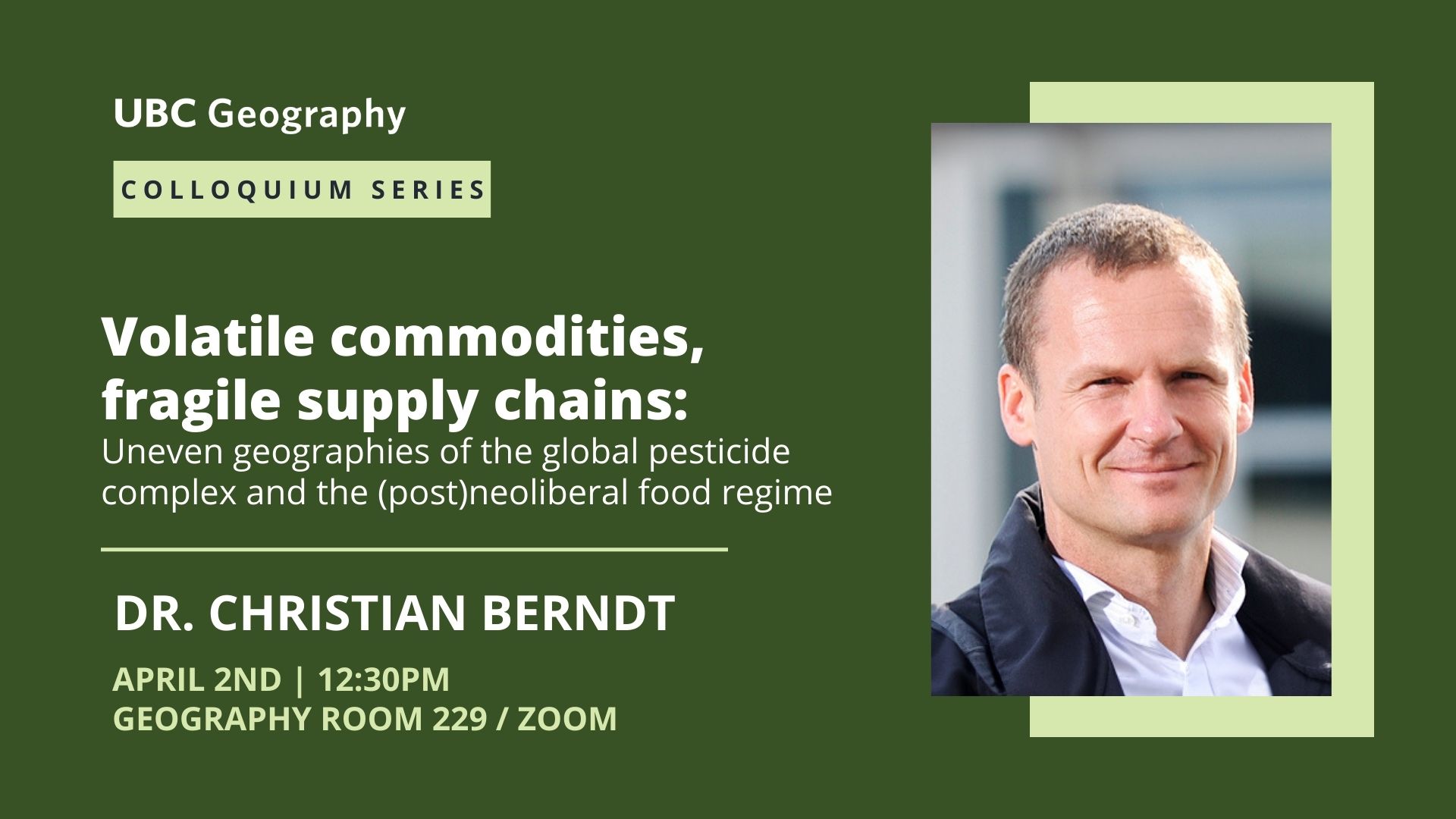

Speaker Bio:
Christian Berndt is Professor of Economic Geography at the University of Zurich. Working at the crossroads of cultural economy and political economy, his research focuses on geographies of marketization and critical commodity chain studies. Most recently he has engaged with the global pesticide complex, agricultural commodity markets, social finance and behavioural economics and policy.
Talk Title:
Volatile commodities, fragile supply chains: Uneven geographies of the global pesticide complex and the (post)neoliberal food regime
Abstract:
Agrochemical inputs have played a crucial role in underwriting a neoliberal food regime characterized by the production of “more and more food with less and less labor”. The era of “cheap food”, however, appears to be over, signaling a food regime in crisis and challenging globalized industrial agriculture (Moore 2015; McMichael 2020). In this paper I join those who argue that claims for an imminent collapse of an agrifood system centered on “cheap food” are premature (Shattuck 2021; Werner et al. 2022). This is most evident on the terrain of agrochemical inputs, above all pesticides, where contradictory processes of biotechnological appropriation and substitution driven by a multi-faceted agroindustrial complex complicate the picture. A generic revolution has significantly cheapened the costs of pesticides and massively increased their availability globally. This did not translate into the productivity increases associated with earlier sociotechnical innovations. However, the rise of China and also India as key sites of pesticide synthesis and formulation enables the continuous production of cheap food, giving shape to an emerging neocolonial global regime facilitated by expansive “south-south” pesticide supply chains.
In my paper I engage with these dynamics drawing on collaborative empirical research that links China with Argentina. An uneven division of labor emerges, where Argentina is a highly intensive user of pesticides imported mainly from China to produce bulk commodities (mainly soy) that are to a large extent exported to China. Of course, the global pesticide complex is confronted with limits and resistance. Geopolitical and geoeconomic risks disrupt supply chains and logistics, prices fluctuate wildly, there are bans and restrictions, chemicals behave strangely and nature’s resistance to active ingredients is a constant threat. However, rather than signaling the demise of neoliberal agroindustrialization, the Sino-Argentinian example demonstrates how the pesticide complex puts these challenges to productive use. Agrochemical capital generates new accumulation opportunities by mobilizing a logic of repair and a modernist belief in technological fixes. It is precisely these contradictory entanglements that illustrate the limits to imaginations of agrochemical intensive agriculture as either in terminal crisis or capable of endless technological fixes (Werner et al. 2022).
References:
McMichael P (2020) Does China’s ‘going out’ strategy prefigure a new food regime? The Journal of Peasant Studies 47(1). Routledge: 116–154.
Moore JW (2015) Capitalism in the Web of Life: Ecology and the Accumulation of Capital. New York: Verso.
Shattuck A (2021) Generic, growing, green?: The changing political economy of the global pesticide complex. The Journal of Peasant Studies 48(2): 231–253.
Werner M, Berndt C and Mansfield B (2022) The Glyphosate Assemblage: Herbicides, Uneven Development, and Chemical Geographies of Ubiquity. Annals of the American Association of Geographers 112(1): 19–35.
This is hybrid event hosted in Geog 229 and on zoom. No registration required for in person attendance.